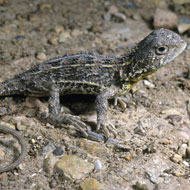
Updated Red List shows “urgent action” is needed
More than 26,000 of the world’s species are now threatened with extinction, according to the recently updated IUCN Red List of Threatened Species.
Jane Smart, director of the IUCN’s Biodiversity Conservation Group, said the updated list shows that “urgent action” is needed to conserve threatened species. She called for countries across the globe to fast track their conservation action at a national level.
The list now includes 93,577 species, of which 26,197 are facing extinction.
Almost all of Australia’s reptiles are included in the list and seven per cent are threatened with extinction, as a result of rising peril from invasive species and climate change.
Among these is the now endangered grassland earless dragon, which faces predation by invasive feral cats and changes to the intensity and frequency of fires.
Meanwhile, the Mitchell’s water monitor entered the list as critically endangered, having suffered declines of up to 97 per cent in some areas, due to eating toxic cane toads, which were introduced to Australia in 1935.
Elsewhere, the Mauritian flying fox is now endangered after a government culling campaign, which was said to be motivated by damage to lychee and mango fruit crops. Other threats include deforestation, cyclones, illegal hunting and accidental mortality from power lines.
Despite serious threats to amphibians generally, four species that were previously thought to be critically endangered, possibly extinct or extinct, have been rediscovered in Colombia and Ecuador. The Rio Pescado stubfoot toad, Quito stubfoot toad and Atelopus nanay were all thought to have disappeared due to chytridiomycosis disease. The Carchi Andes toad was also feared to be gone.
Jennifer Luedtke of the IUCN said that while these rediscoveries are “encouraging”, the species are still negatively impacted by human activity, which highlights the urgent need to improve their conservation to prevent extinction.
IUCN director general Inger Anderson said the updated list “reveals the onslaught of threats that our planet’s diversity is facing”.
She added: “Invasive species, changes to fire patterns, cyclones and human-midlife conflict are just some of the many threats wreaking havoc on our planet’s ecosystems.
“As species from Mauritius to Australia slip towards extinction we risk losing a part of our culture and our identity, as well as the life-supporting benefits these species provide by pollinating our crops or preserving healthy soils.”
Image © John Wombey, CSIRO/CC BY 3.0



 The latest
The latest